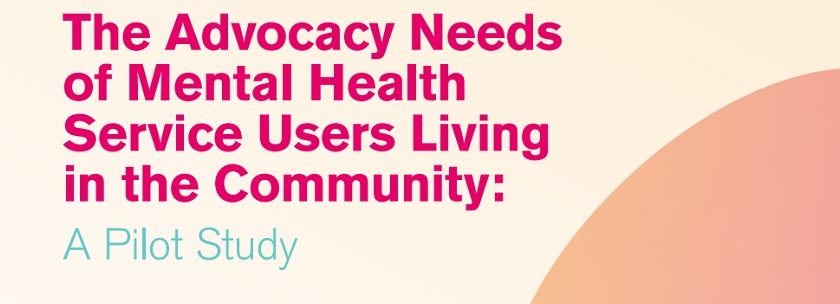Blog
Report launched – Advocacy needs of those who use the Mental Health Services
- August 2, 2017
- Category: Blog Events External Affairs & Policy Of interest from media Stakeholders Uncategorized

Mental Health Reform launched a new report yesterday entitled, The Advocacy Needs of Mental Health Service Users Living in the Community: A Pilot Study. The report, launched by Ombudsman Peter Tyndall, examines the need for independent, one-to-one advocacy supports for people who use mental health services and who need help to make decisions or access their rights and entitlements.
Speaking at the launch of the report, Shari McDaid, Director of Mental Health Reform and Principal Investigator in the study, said, “We hear too often that people do not have a voice in decisions about their own mental health treatment. This report shows that some people with mental health difficulties lack the confidence to raise concerns about public services that they receive, including mental health services. When these situations arise, people should have access to an independent, one-to-one advocate, so that they can have their views heard in decisions about their treatment and have their rights and entitlements fully respected.”

Dr. McDaid continued, “The significant picture that emerges from this report is that for a group of people who use mental health services in an area of high deprivation and poverty, there is a clear need for greater access to advocacy supports, as well as information on how to make a complaint to the HSE. It is very significant that two-thirds of participants in this study did not know how to make a complaint about the HSE mental health services. The HSE mental health services should be proactive in explaining to service users how they can make a complaint and encourage both negative and positive feedback. Overall, the Minister of Social Protection, the Minister of State for Mental Health and the relevant agencies (Citizens Information Board and HSE) should review the findings of this report and consider how they can ensure that the scope and capacity of publicly-funded advocacy services are adequate to meet the needs of people with long-term mental health difficulties living in the community.”
Launching the report, the Ombudsman, Peter Tyndall said,
“I greatly welcome the publication of this report. Often, people receiving treatment for mental health difficulties will greatly benefit from the support of an independent advocate to guide them through the system, help them to understand their condition and treatment, and to get answers to questions that are troubling them.”

Other speakers included Head of Engagement in HSE Mental Health Division and former REFOCUS joint-chair Liam Hennessy who pointed out the recent roll out of 30 peer support workers across the country and an upcoming HSE advocacy pilot scheme in CAMHS. He also suggested that changes to basic practices on wards hold no extra cost and can make a big difference to people’s experience of the services.
Noreen Fitzgibbon of the Irish Advocacy Network described how the organisation shows people living examples of recovery, especially to those who work within the services who may not believe recovery is possible. The organisation aims to enable people to advocate for themselves, as opposed to advocating for people, which allows those who use the services to begin to regain control over their treatment and lives.
